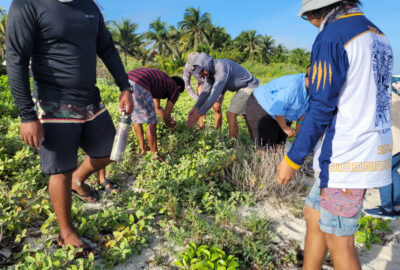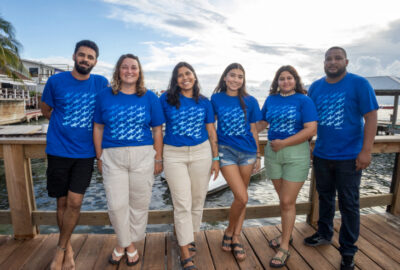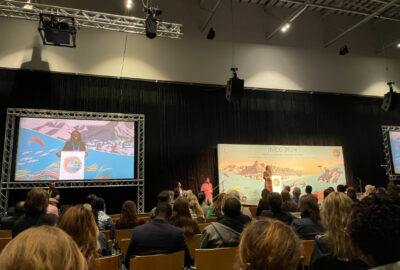We are SOLD OUT of tickets for today, Saturday April 19th.
Please note: We strongly recommend purchasing tickets in advance to guarantee entry tomorrow onward, as we do sell out during school vacation week (April 19 – 27).
Over Two Decades of Data Show Small Grants Advance Ocean Equity
As the Marine Conservation Action Fund celebrates 25 years, a recently published paper highlights how small grants programs contribute to ocean conservation worldwide.
By New England Aquarium on Tuesday, December 17, 2024

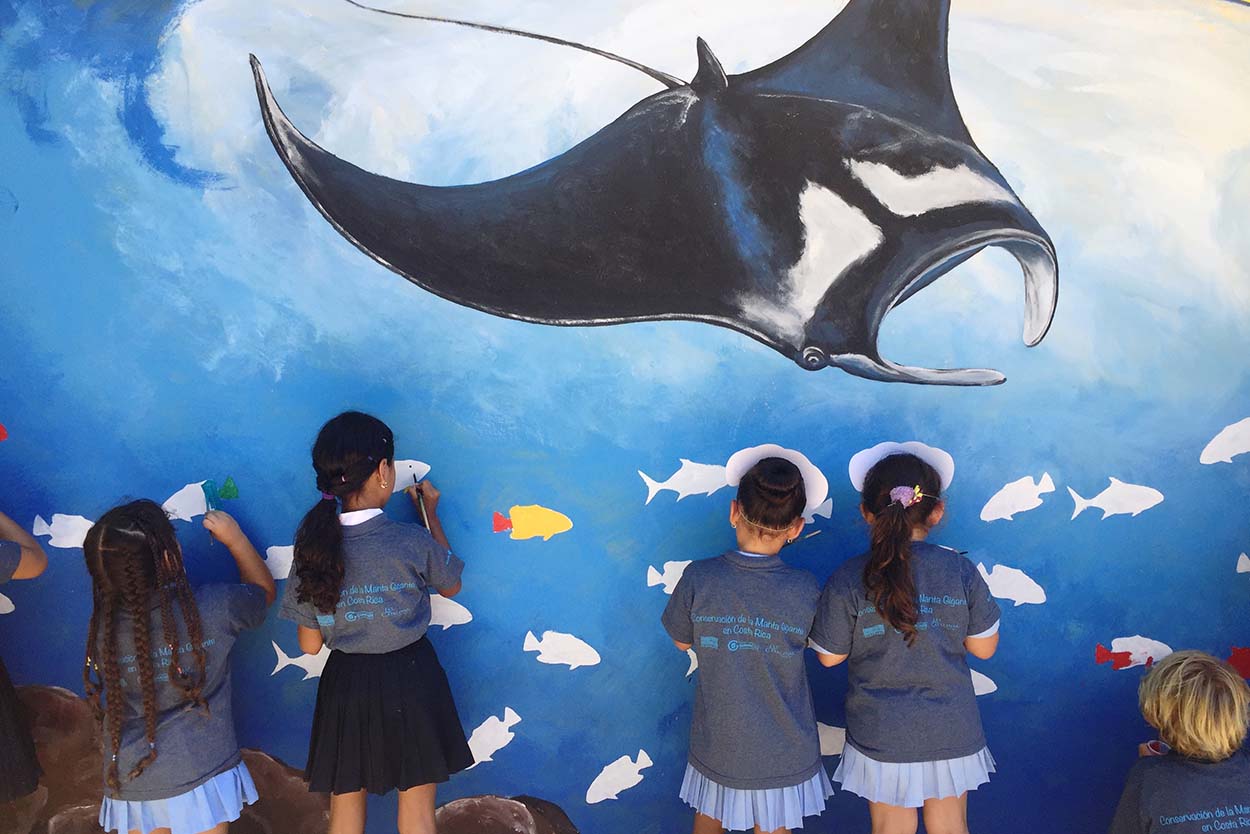
In 2024, the Marine Conservation Action Fund (MCAF) celebrated 25 years of supporting locally based conservation projects and leaders worldwide—and a recently published paper authored by MCAF staff, fellows, and collaborators showed the impact of that work.
Through MCAF, the Aquarium has supported conservation leaders in low- and middle-income countries whose projects improve the health of the ocean and ocean animals. Since its founding in 1999, MCAF has invested over $1.8 million in more than 230 projects across more than 60 countries.

“The powerful idea behind MCAF is that community leaders around the globe are working on small-scale, local projects in their countries and making a major difference in saving at-risk marine species while contributing to the overall global health of our ocean,” said MCAF Director Elizabeth Stephenson. While project leaders who live and work in these low- and middle-income countries are often “best positioned” to connect with local stakeholders and implement long-term solutions, funding opportunities usually go to those from higher-income countries who work in low- and middle-income countries without meaningful local collaboration—a phenomenon known as parachute science.
After MCAF’s first decade, the program began only supporting projects in low- and middle-income countries and, more recently, only supporting leaders who are nationals of the countries where they are directing the work. “MCAF works to ensure that local leaders and their organizations have the funding and resources they need to spearhead conservation initiatives over the long term,” Elizabeth said.
“Funding local leaders ensures that those on the ground, at the forefront of these conservation issues who often work with shoestring budgets year after year, are recognized, supported, and given a seat at the table,” said longtime MCAF Fellow Dr. Asha de Vos of Oceanswell in Sri Lanka and The Oceans Institute in Australia, and a co-author on the MCAF study published in the journal Biological Conservation. “It creates a sense of custodianship and inspires future leaders to emerge from these communities. In the end, to save the world’s largest ecosystem, we need to build the world’s largest team.”
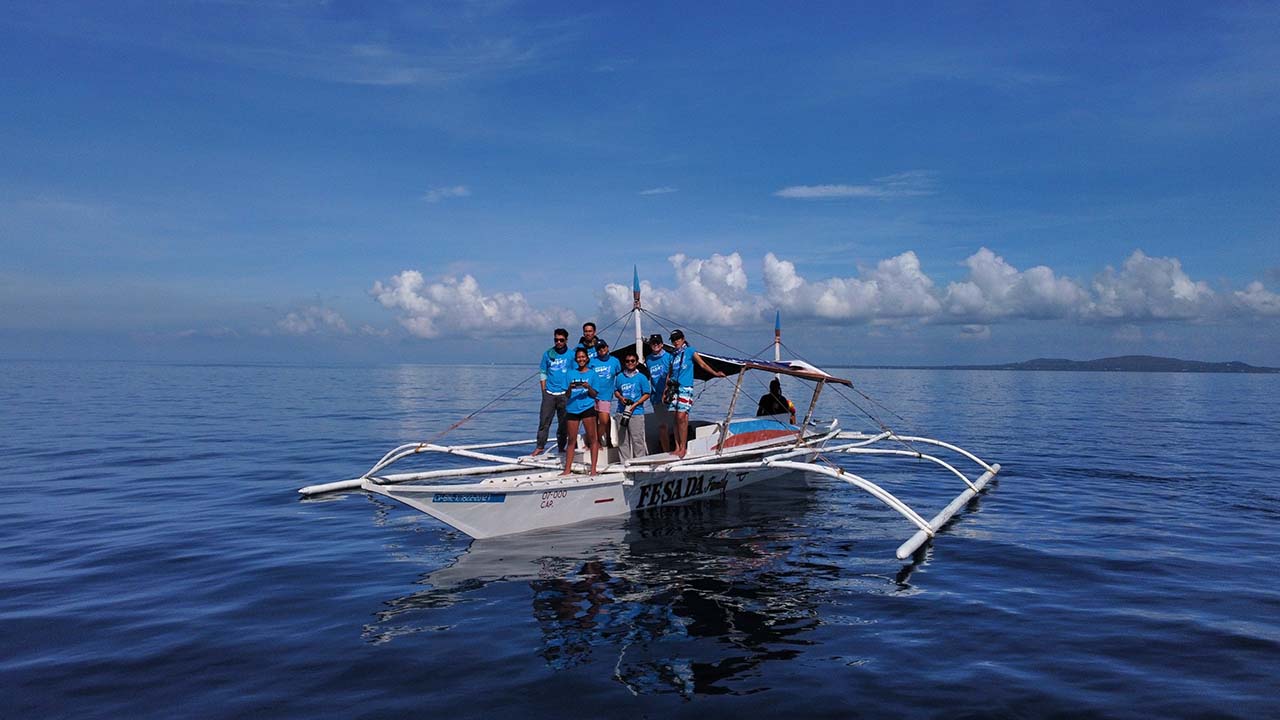
Making an immediate impact
The paper highlights how small grants programs like MCAF can address conservation challenges while promoting social equity. MCAF is used as a case study for the paper because of the program’s long history, which provides more than two decades of data on small ocean conservation grants. Reflecting on these data, the authors draw attention to the characteristics of grant programs that make them accessible to local leaders from low- and middle-income countries, including providing flexible funding and leaving project design in the hands of the project leaders.
The authors also analyze project characteristics and outcomes from MCAF’s grantmaking from 1999-2020. Projects supported by MCAF had immediate impacts, like filling knowledge gaps, protecting individual animals, and strengthening marine protected areas (MPAs). They also contributed to lasting conservation impacts, including new species protections, creating new MPAs, and sustained research and monitoring efforts.
Projects that have yielded high-impact results over the past 25 years include:
- MCAF Fellow Andrés López and Project Leader Ilena Zanella, co-founders of Misión Tiburón, spearheaded efforts that led to the declaration of Costa Rica’s first shark sanctuary in 2018.
- MCAF Fellow Kerstin Forsberg, founder/director of Planeta Océano, led the successful community-based effort to achieve national protection for giant manta rays in Peru in 2016.
- MCAF Fellow Tomas Diagne has been working to save threatened and endangered sea turtles in Senegal for more than 25 years.
Florencia Vilches, an MCAF fellow working to protect southern right whales in Argentina, also spoke to MCAF’s impact over the decades: “I now coordinate a team of four local female researchers, and I lead a citizen science project to integrate southern right whale photos taken by whale watch operators. Hundreds of new whales were added to the catalog, and hundreds of new re-sights were added to the live histories of known whales, some of which we hadn’t seen for decades.”
Along with supporting established and emerging leaders from low- and middle-income countries, the paper’s authors recommend offering multi-year unrestricted funding and long-term support, and regularly seeking feedback from project leaders on strategy and funding decisions. Although MCAF initially focused solely on new and urgent projects, in its second decade, the program began offering more follow-on funding to amplify impact and help ensure continuity of the work.
MCAF provides small grants of up to $12,000 for community-based, on-the-ground projects and leaders. Over the years, the program has expanded to invest in and support the work of 17 global fellows who receive financial, technical, and professional resources to help support and sustain their organizations. Through two-way mentoring, knowledge exchange, and community building, the fellows share their expertise and best practices in effective and equitable conservation.
“Through listening to and learning from the community the program serves, we recognized the importance of supporting projects and leaders over the long term and in a multitude of ways that extend beyond grantmaking,” said Elizabeth.
In the coming years, thanks to the support of donors, including Alan and Lisa Dynner, MCAF plans to grow the program and its global community. “As we look back on 25 years, it’s been an honor to have been able to support such a dynamic, creative, and successful group of committed local leaders in countries all over the world,” Elizabeth said. “We look forward to continue learning from this global community of leaders whose work is vital to the health of marine species, habitats and all who depend on our interconnected ocean.”
Learn more about the study
/
Joining current MCAF staff as co-authors on the study are former MCAF Coordinator Bess-Lyn Edwards; and MCAF fellows Dr. Asha de Vos of Oceanswell in Sri Lanka and The Oceans Institute in Australia, Kerstin Forsberg of Planeta Océano in Peru and Migramar of California, and Dr. Nelly Isigi Kadagi of World Wildlife Fund; Benny Berger and Dr. Michael Tlusty of University of Massachusetts Boston; and Dr. Jessica V. Redfern, associate vice president of ocean conservation science in the Aquarium’s Anderson Cabot Center for Ocean Life.









